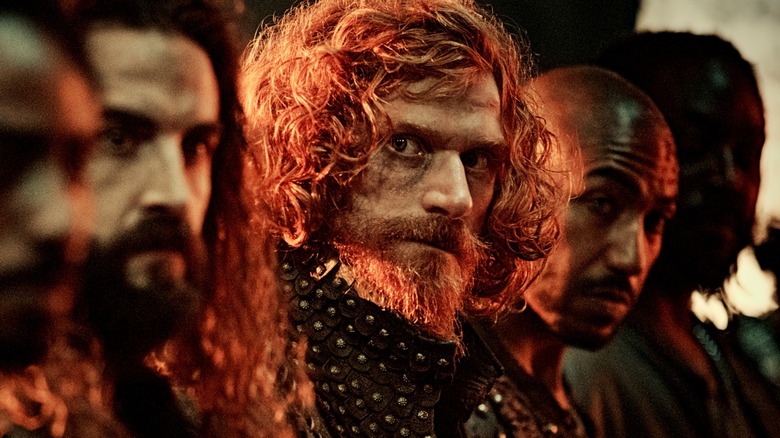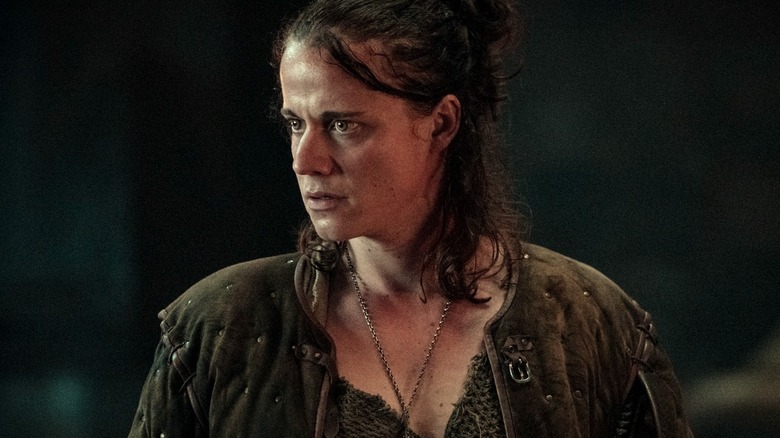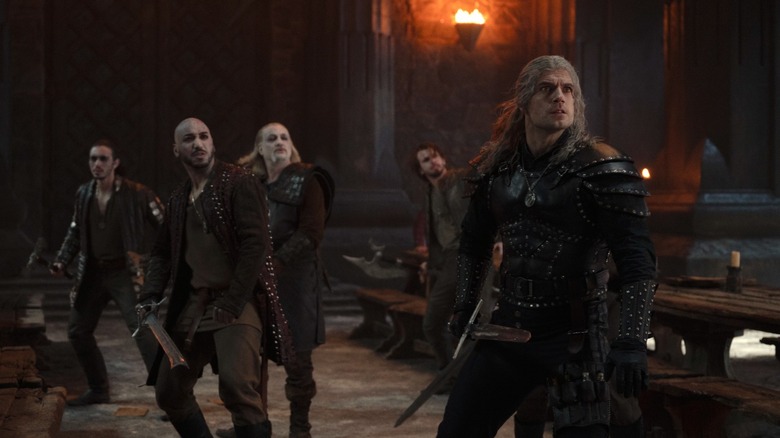The Other Witchers In The Witcher Are Very Bad At Witchering
Warning: major spoilers ahead for "The Witcher: Nightmare of the Wolf" and "The Witcher" season 2.
Witchers are the best of the best. They're recruited as children: dropped off at Kaer Morhen by parents who don't want them, or are brought back by witchers who acquired them on their travels. Less than a third survive the Trial of the Grasses, the alchemical process used to alter their bodies and make them stronger, faster, more durable, and able to see in the dark and withstand the elixirs used to heighten their abilities in battle. Fewer still survive the years of brutal training that follow, and their first few years in the field. Those who survive do so because they have been honed in every way to do one thing: kill monsters.
And apparently they're still not very good at it. At least, as far as we've seen in Netflix's adaptations of the "Witcher" novels by Andrzej Sapkowski: the live-action "Witcher" series starring Henry Cavill, and the anime tie-in movie "The Witcher: Nightmare of the Wolf," which serves as a prequel to "The Witcher" season 2 and centers on a young Vesemir.
"The Witcher: Nightmare of the Wolf" goes the furthest in proving that Geralt was not a fluke and there are, in fact, other witchers who are competent at fighting. But it's also a movie about the fall of Kaer Morhen, which means that the first meaningful look we've had at witchers other than Geralt ends with almost all of them being slaughtered, save for Vesemir, a young Geralt, and a handful of other witchers-in-training.
The events of "Nightmare of the Wolf" are key to Vesemir's motivation in "The Witcher" season 2; since the mutagen used to create witchers was destroyed in the attack on Kaer Morhen, Ciri and her Elder Blood represent the first and perhaps only chance to create new witchers and prevent them from being wiped out entirely. Unfortunately, "The Witcher" season 2 will also leave you wondering ... why bother?
Witchers: Kind of Overrated
"The Witcher" season 1 only featured one other witcher who wasn't Geralt, and that witcher was already a corpse by the time we caught up to him — killed by a striga in the line of duty. In season 2, however, Geralt and Ciri travel to Kaer Morhen for the winter and spend time with the other remaining witchers, including Lambert, Eskel, Coen, and Vesemir.
The death of Eskel has already caused a stir among fans of the "Witcher" books and games, since he's a fairly prominent character who is killed off in the same episode where he makes his debut. When we first meet Eskel, he's returning home from an attempt to kill a leshen that ended with him only successfully removing one of its hands. Fair enough, we all have bad days. Eskel, who has supposedly had displays of emotion beaten and medicated out of him since childhood, visibly bristles and reacts confrontationally to the mere suggestion of disrespect from Ciri (she laughs along with a joke at his expense). He then gets drunk, parties with some local prostitutes, and dies because he failed to notice that he was turning into a tree.
But Eskel's death is practically noble compared to the witchers who get taken out in the season 2 finale, "Family." Three get stabbed to death in their sleep by a possessed Ciri, whose demonic guest somehow doesn't set off their medallions (they're supposed to vibrate in the presence of magical creatures and other forms of magic). Medallion or not, you would think that "not getting stabbed in your sleep" would be covered in Year One of witchering school.
More witchers are brutally and very quickly killed by a pair of basilisks, which is arguably even more embarrassing than getting assassinated in bed, given that the whole purpose of witchers is to kill monsters. There's a throwaway line noting that the basilisks are mutated and more powerful than the standard variety, but even so, you'd expect half a dozen fully juiced-up witchers to be able to handle them with ease. When Geralt faces off against a third basilisk, the biggest of all, he defeats it in under a minute by blasting it in the face with igni and stabbing it through the skull.
Nothing we see in the other witchers' fighting styles, except for the occasional throwing of witcher signs, matches what we've been told about witchers. We're told that they've each had more than a lifetime of combat experience and weapons training, but for the most part we see them just kind of flapping their axes and swords at the basilisks ineffectually before getting their heads bitten off. We're told that they're supernaturally fast, strong, and durable, but there's no evidence of this. We're told that they're lone, wandering mercenaries who rarely meet each other out in the real world, yet it doesn't take very long at all for the witchers to resort to begging Vesemir for help. We're told that they've purposefully suppressed emotions like fear, but when confronted with the basilisks they A) panic and B) ask their daddy to come and rescue them.
A Missed Opportunity
Rather than showing off witchers' talents, the final battle makes a strong case for their obsolescence. Speaking in the behind-the-scenes special "The Witcher: Unlocked" (via Redanian Intelligence), showrunner Lauren Schmidt Hissrich said that this was deliberate:
"I mean, so much of season 2 is about the fact that ... Is the witcher brotherhood over? I mean, that's really what Vesemir's character is dealing with all season, is this emotional sense of: 'Is this the end of life as we know it for witchers?' So, of course we had to kill more. We had to make it more painful for him ... We just had to make sure that we were really driving home that point, that the Continent is constantly changing, and is there a place for witchers anymore?"
Unfortunately, witchers are killed off so easily in "The Witcher" season 2 that it raises the question of how they were ever useful in the first place.
It's clear what "The Witcher" season 2 was trying to do with all these witcher deaths: shock the audience, and establish just how powerful Ciri is. Unfortunately, the deaths aren't particularly shocking because we barely know these characters, and they don't convey any power on Ciri's part because the witchers we see die were never shown being competent, let alone elite. We're told that witchers are mighty warriors, but outside of Geralt's exploits we don't see it. The other witchers don't even have mutagenic traits like Geralt's yellow eyes. For most of the season they could be mistaken for random drunk tavern-crawlers who have ended up in Kaer Morhen by accident.
This greatly undermines Vesemir's drive to create new witchers using Ciri's blood. Vesemir claims that a new generation of witchers are needed to fight the coming wave of monsters, but it's hard to buy into his desperate mission when the main thing we've seen witchers do is ... die. From "Nightmare of the Wolf" to the "Witcher" season 2 finale, they've proven very good at dying dramatically in battle, but not particularly good at emerging victorious from battle. Going to the effort of whittling down 20 orphans into four or five fully-grown witchers feels pointless when even the survivors seem like they could meet their doom by tripping over an uneven paving stone.
There's also a missed opportunity here. The final battle in "Family" could have been used to demonstrate how all witchers, not just Geralt, are formidable fighters who remain cool-headed when facing the largest and strongest of monsters. It could have taken all the things we've been told about witchers and made them feel tangible. Instead, the finale reduces several of the remaining witchers to nothing more than red shirts, despite the fact that being a red shirt is kind of conceptually incompatible with being a witcher. By definition, any red shirt witchers should have been killed off during the trials.
It's not impossible for "The Witcher" to redeem the image of witchers in season 3, using the few witchers that are left. But we may need a moratorium on cheap witcher deaths, especially if Netflix wants audiences to buy into the wider world of witchers for upcoming spin-offs like "The Witcher: Blood Origin." Who knows — perhaps we could even see them winning a fight or two, just to change things up.
"The Witcher" season 2 is now streaming on Netflix.


